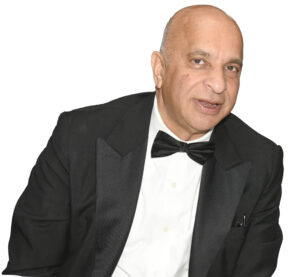- Wednesday, December 04, 2024
ANNUAL GUIDE HIGHLIGHTS THE ROLE OF LEADERSHIP, PERSEVERANCE AND PHILANTHROPY

By: AMIT ROY
THE British Asian business community clearly has done well, as the Eastern Eye Asian Rich List 2024 shows.
The entry point to get onto the list 13 years ago was £25 million. Last year it was £120m, and this year the figure has gone up to £125m. Even allowing for inflation, British Asians are contributing significantly to the UK economy.
But it is worth making the point that British Asian success has not taken place in a vacuum. The seeds of success have been planted in fertile British soil.
This was acknowledged by Bestway Group chairman Sir Anwar Pervez, who came as a 21-year-old from Pakistan in 1956. He described his early days working on the buses in Bradford as among the happiest in his life. Looking back on his long career, Sir Anwar feels he has had more appreciation in Britain than in his native Pakistan.

“I still think that in Pakistan, we have not had the recognition we might have had. We have had more recognition here in Britain than in Pakistan.A few people in Britain might be jealous or talk stupidly, but most people admire you for the hard work you have put in.
“Had I achieved the same success in Pakistan, people would not have believed that I was being honest. They would say I was doing something crafty.
“All in all, I am now happiest in England. I go to the NHS. I used to have a good doctor, but he has left. I see whoever is available. In Pakistan I wouldn’t get the same level of service even if I paid for it.”
The Asian Rich List is more than just a celebration of wealth. It offers an insight into how wealth is used.
Once upon a time, those who did well built schools and hospitals back in their home countries in the subcontinent. That still continues but increasingly, help is given to good causes in Britain.
Steel company ArcelorMittal’s owners, Lakshmi Mittal and his son Aditya, have funded a wing at the Great Ormond Street Hospital for Children in London, and also set up a professorship in vaccinology at Oxford University.
Nirmal Sethia has remembered his late wife, Chitra, by giving millions to the advancement of robotic surgery at University College Hospital.
Apurv Bagri and his wife, Alka, have sponsored the arts through the Bagri Foundation. Dinesh Dhamija has given £1m to his alma mater, Fitzwilliam College, Cambridge, to accelerate the development of computer sciences.
Of course, the British Asian business community extends well beyond the 101 people on the list.
Recently, Narayana Murthy, a co-founder of the Indian IT giant Infosys, and father-in-law of prime minister Rishi Sunak, attracted attention by suggesting people work harder: “Our culture has to change to that of highly determined, extremely disciplined and extremely hardworking people, and that transformation has to come from youngsters. My request is our youngsters must say, ‘This is my country, I want to work 70 hours a week.’”

Many people from the first generation would probably be glad to see their working week cut to 70 hours.
Asian newsagents routinely get up at dawn to untie newspaper bundles as they are delivered and don’t close their shops until 11pm or even midnight.
Whether these qualities will be passed on by first generation immigrants, now in their 80s, to their children and grandchildren, remains to be seen. But the evidence is that sons and daughters are taking over the running of family business. It is often said that wealth is created by one generation to be dissipated by succeeding ones. This appears not to be happening with British Asians – so far at least.
Asians do not need to have the moral case for creating wealth explained to them. This might seem slightly esoteric to those who are not Asian, but wealth is depicted as entirely desirable in the great Indian epic, the Mahabharata.
In it, prince Arjuna exhorts his brother Yudhishthira, who wants to renounce all his wealth and live an ascetic life in the forests, to exercise his duties as a king.
Although Yudhishthira, with his four Pandava brothers and the support of Lord Krishna, has won a convincing victory on the Kurukshetra battlefield against his 100 cousins, the Kauravas, he is now filled with remorse that he shed the blood of kith and kin in the process.
But Arjuna, exasperated by Yudhishthira’s lack of ambition, tells him that basically he must be the CEO and managing director of the family firm.
“Having sacrificed so much, so many lives, and acquired a kingdom, it is your duty to rule it, lest it should fall into lesser hands than yours and suffer,” says Arjuna. “It is your duty to rule and enjoy, support the poor, support the sacrifices, and maintain God’s justice as a ruler.”
Arjuna goes on: “You will never be able to achieve this unless you have kingly power, acquired by legitimate means decreed for a kshatriya (the warrior caste). You will never be able to discharge your duties in this respect unless you have prosperity and wealth. A pauper can never help others, a weakling can be of no use to his fellow men. A life of renunciation is only for mendicants and not for us.”
Then Arjuna gets to the heart of the matter: “A man possessed of wealth is regarded as learned and worthy of respect; wealth brings about more wealth. Religious activities, pleasure, enjoyment and every fulfilment of life proceed from wealth.” Two other trends are noticeable in the Asian Rich List.

One is that Dubai, in the United Arab Emirates, with its low rates of income tax, is becoming increasingly attractive to British Asians. Many have bought apartments there and use it as a base to expand their global businesses. British governments must take care that the UK’s loss does not become Dubai’s gain.
There is also optimism that the UK-India Free Trade Agreement, whenever that is signed, will create 300,000 new jobs in the UK within three years.
One question often asked is: “How do you become rich?”
Sri Prakash Lohia, the founder chairman of the Indorama Group, who hails from the Marwari community in Rajasthan, has suggested being entrepreneurial is in his DNA.
Chapter one in his memoir, Threads of My Life, is about “Marwari acumen”.
“Business is in my blood and it’s my firm belief that I was always destined to succeed as an entrepreneur,” it begins.
“When I say business is in my blood, it is with good reason. The Lohias are Marwari people, a group originating from the Indian state of Rajasthan and famed across the country for our flair as traders and investors. Marwaris have a ‘get up and go’ attitude. This trait was born out of necessity, given that 70 per cent of Rajasthan is made up of the Thar desert.”
The late Srichand Hinduja, who turned the family business inherited from his father into a global empire, once explained that “nature is my teacher”.
He claimed that he learned investment banking from the squirrels he and his brother Gopichand fed in St James’s Park, London: “If you give two nuts to a squirrel, it will eat one and bury the other one for a rainy day – it is never greedy.”
Nushrratt Bharuccha on Chhorii, pressure of comparison with Lapachhapi, upcoming…
Abhimanyu Dassani on Meenakshi Sundareshwar, how his mom Bhagyashree reacted…
It’s a wrap for Prabhas, Kriti Sanon and Saif Ali…